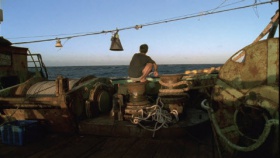Chronicle of the Sea, Nan-Fang-Ao
Country:
- Taiwan
- 35mm
- Urban
- Rural


Synopsis
Nan-Fang-Ao, a village in northeast Taiwan, once thrived on its big-net fishing industry. Now migrant workers from the Philippines and China vigorously live and work with the locals on one of the few remaining fishing boats. As we observe their life at sea, where the air is abuzz with different languages and gestures, thoughts of home drift among those who have come to provide for their families. There is the captain who talks about the old days, the woman who sent her husband off to sea and runs a shop in the village, and the laborers from foreign countries who buy gifts for their families at the market. With a fresh look, the film depicts people living on the unchanging stage of the ocean’s vast wilderness.
Source: YIDFF
http://www.yidff.jp/2005/cat035/05c057-e.html
Director Statement
Chronicle of the Sea, Nan-Fang-Ao tells the story of a group of people whose lives depend on the sea, and how they accept their fate while searching for dignity and pleasure in their lives. Taiwanese, mainland Chinese and Filipino men all work on the same boat. They each face their own predicaments, and miss their wives and children as they try to provide for them.
The film is a lyrical meditation on the age-old relationship between fishermen and the sea, mingling loneliness, nostalgia, hopes and dreams. Between these men and the ocean, there is both symbiosis and struggle. The dangers of life at sea and the unpredictability of their income make uncertainty part of the collective consciousness of fisherman. While the film shows how hard these fishermen work, it also reflects the conflict between man and marine ecology. The continued decline in the number of fish and the elimination of mackerel purse seine fishery raises the question: what does the future hold for these people?
Taiwan is an island, surrounded by the sea. Yet during the many years of martial law, access to the ocean was restricted; only professional fishermen could leave the shore. Most Taiwanese people have had little chance to imagine what life on the open sea is like. Therefore, the very production of this film is significant.
For a female producer and director, making this film was particularly difficult. The difficulty lay not in entering the masculine society of fishermen, but rather, in the traditional taboo forbidding women from going out to sea on fishing boats. However, I always gain knowledge from making a documentary, and I also experience the sorrow, pain and joy of life through the characters in the film. In the end, I am always the one who benefits most.
Source: YIDFF
http://www.yidff.jp/2005/cat035/05c057-e.html
Festivals & Awards
2004 Golden Horse Awards - Best Documentary
2004 Golden Horse Awards
2005 Yamagata International Documentary Film Festival
2005 Yamagata International Documentary Film Festival
Team
- Director
- Producer
- Sound Recorder
- Cinematographer
- Editor
- Editor
- Sound Designer
- Assistant Producer
- Assistant Producer
- Assistant Producer
- Sound Recorder
- Sound Recorder
- Cinematography Assistance
- Cinematography Assistance
- Cinematography Assistance
- Marketing Manager
- Cinematographer

